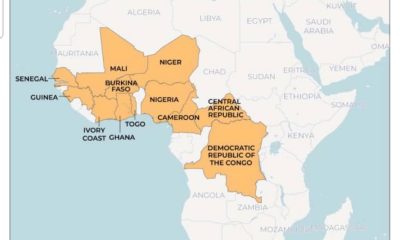NATIONAL NEWS
Nigeria Reaffirms Commitment To Climate Action, Just Energy Transition At Landmark Regional Conference

Nigeria has reaffirmed its leadership in tackling climate change, pledging bold action on climate resilience and a just energy transition.
At the opening of the inaugural WASCAL International Conference on Climate Change and Just Energy Transition
(I3C-JET), the Federal Government signaled its commitment to driving Africa’s clean energy future.
Minister of Environment, Balarabe Abbas Lawal, emphasized that while Africa contributes the least to global carbon emissions, the continent is determined to lead through equity, innovation, and sustainable development.
Held in Abuja, the three-day conference brought together a wide array of participants from across Africa and beyond
including policymakers, scientists, investors, civil society, youth, academia, and development partners.
In his address, Lawal highlighted the continent’s disproportionate exposure to climate impacts and stressed the urgency of locally driven solutions that are inclusive and equitable.
“The world is watching Africa. Even though we are not major contributors to global warming, our resolve to be part of the solution remains firm and inspiring. Africa is ever ready to serve as the architects of a new energy paradigm built on equity and innovation,” he said.
He reiterated Nigeria’s ambitious climate and energy goals, noting that the country’s Energy Transition Plan serves as a guiding framework to reach net-zero emissions by 2060 while expanding energy access across communities.
“Nigeria’s commitment to a Just Transition is clear, deliberate, and rooted in our belief that no one should be left behind in the journey toward a low-carbon and climate-resilient future. Through a developed Energy Transition Plan, we aim to achieve net-zero emissions by 2060 while ensuring universal access to modern energy by 2030.”
Lawal called on stakeholders present to move beyond rhetoric and push for real, scalable change.
“I urge us all to move beyond declarations to translate our shared vision into actionable frameworks that empower communities, protect livelihoods, and unlock the enormous opportunities of the green economy.”
The Minister further encouraged delegates to use the conference as a springboard for lasting partnerships and science-informed policies that drive real-world impact.
“Let us harness the wealth of knowledge, research, and innovation represented here to generate practical solutions and evidence-based strategies that will not only drive sustainable development but also enhance resilience across our communities.”
He praised WASCAL and the National Organizing Committee for convening the timely summit and stressed the importance of pan-African and global collaboration.
“Nigeria values WASCAL as a trusted partner in strengthening climate science capacity across West Africa. Together, we are building a foundation for a resilient and low-carbon future that speaks to our realities. I would like to seize this opportunity to call on all participants to use this conference as a platform to deepen dialogue, strengthen partnerships, and translate scientific research into actionable policies that will transform our societies and safeguard our shared future.”
Speaking in his capacity as Chairman of WASCAL’s Governing Board and Nigeria’s representative on the Board, Professor Chinedum Nwajiuba echoed similar sentiments, describing Nigeria as a key trigger point for Africa’s climate solutions.
“We can therefore imagine that for Africa to shoot down her challenges, Africa’s gunshots have to be triggered here in Nigeria. In several ways, that is what this conference represents to trigger Africa’s scientific and intellectual communities, in alliance with her political leadership and global partners, for evidence-based responses to climate change and just energy transition.”
Prof. Nwajiuba highlighted the gap in African scientific contributions to global climate discourse and called on WASCAL to lead in closing that divide.
“It can be said that Africa’s scientific contributions should be more than is currently the case. If we look at the intercontinental contributions to the Intergovernmental Panel on Climate Change (IPCC), it becomes clear that African scientists need to do more.
I also believe there is no better-positioned body than WASCAL to lead this charge. I therefore appeal to all stakeholders in and outside Africa to support WASCAL to drive Africa’s voice in global climate science.”
Referencing the dual threats of flooding and water scarcity in the region, Nwajiuba proposed a bold solution: re-channel floodwaters from the Niger and Benue rivers to help replenish the shrinking Lake Chad.
“We have dual challenges, historically supported reducing Lake Chad, and increased frequency of flooding. Sometimes I imagine, why can’t we arrest the floods on and around the Niger and Benue, and re-channel that into Lake Chad? Why indeed can’t we do that? These are the kinds of bold, science-backed ideas we must begin to seriously consider.”
He emphasized that the I3C-JET conference is more than just another event; it is a call to action.
“That is also in line with the idea of this conference to trigger thought backed by science, to trigger evidence to engage policymakers, to trigger action to address current and future challenges.
WASCAL has committed to taking the outcomes of this conference beyond these rooms, and we hope to deliver policy and action briefs to our stakeholders, consistent with our third mandate, which is the provision of climate services,” he added.
Also addressing the gathering, WASCAL Executive Director, Prof. Emmanuel Ramde, reaffirmed the organization’s mission of advancing climate resilience through research, training, and regional cooperation.
“At WASCAL, our mission remains clear: to strengthen the resilience of West African countries against climate change through capacity building, research excellence, and climate services. Since our establishment, we have graduated over 700 Master’s and PhD holders, set up a world-class Competence Centre in Ouagadougou, and continue to drive regional climate services that empower communities, farmers, and governments to make informed choices.”
He emphasised the need for member countries to take ownership of the WASCAL agenda for long-term sustainability and impact.
“Despite our progress, we must acknowledge a growing need for greater ownership of WASCAL by its member countries. WASCAL belongs to West Africa—it is not just a programme; it is our shared legacy. Only through collective ownership, shared responsibility, and sustained investment by African governments can we ensure the long-term impact, sustainability, and autonomy of this vital institution.”
Prof. Ramde positioned the I3C-JET conference as a catalytic platform to influence policy, connect sectors, and inspire innovation.
“This conference, I3C-JET, is not just an event—it is a movement. It provides a unique and much-needed platform for dialogue between science, policy, and society to bridge knowledge gaps, exchange bold ideas, and co-create actionable solutions for climate resilience and energy justice in Africa.”
He closed by acknowledging the collaborative spirit that made the conference possible.
“This gathering would not have been possible without the unwavering support of our partners from the German Federal Ministry of Research, Technology, and Space, whose consistent backing has shaped WASCAL’s evolution, to Barani Meteo Innovations from Slovakia, who came all the way to share their climate monitoring technologies.
Let us remember: climate resilience is a global goal. Our success lies in how well we collaborate, learn from each other, and build together—from West Africa to the world.”
-
CRIME4 years ago
PSC Dismisses DCP Abba Kyari, To Be Prosecuted Over Alleged $1.1m Fraud
-
FEATURED4 years ago
2022 Will Brighten Possibility Of Osinbajo Presidency, Says TPP
-
FEATURED2 years ago
Buhari’s Ministers, CEOs Should Be Held Accountable Along With Emefiele, Says Timi Frank
-
BUSINESS & ECONOMY2 years ago
Oyedemi Reigns As 2023’s Real Estate Humanitarian Of The Year
-
SPORTS2 years ago
BREAKING: Jürgen Klopp Quits Liverpool As Manager At End Of Season
-
SPORTS2 years ago
Could Liverpool Afford Kylian Mbappe For €200 million? Wages, Transfer Fee
-
ENTERTAINMENT2 years ago
Veteran Nigerian Musician, Basil Akalonu Dies At 72
-
FEATURED2 years ago
Tribunal Judgement: Peter Obi Warns Of Vanishing Electoral Jurisprudence, Heads To Supreme Court
-
BUSINESS & ECONOMY2 years ago
Oyedemi Bags ‘Next Bulls Award’ As BusinessDay Celebrates Top 25 CEOs/ Business Leaders
-
FEATURED4 years ago
2023 Presidency: South East PDP Aspirants Unite, Demand Party Ticket For Zone


































